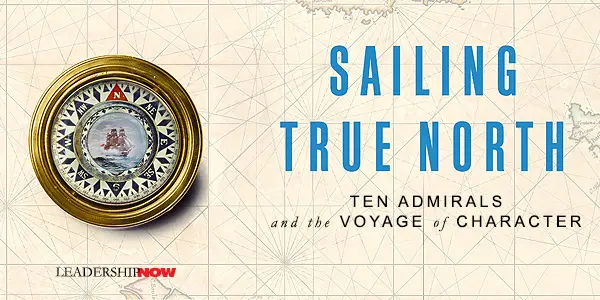 |
 |
11.04.19

Sailing True North and the Voyage of Character
THERE IS NO SUBSTITUTE for character. Better systems, better laws can’t make up for it. Without good character, leaders can go south fast. The problem is that there is very little attention paid to how to develop good character. We learn best by example, but it is wise to look into the lives of others and understand the outcomes of their lives as a result of their character or lack of it. Four-star U.S. Navy Admiral and former Supreme Allied Commander of NATO James Stavridis gives us a comprehensive look at ten admirals in Sailing True North. He looks at their differing character traits and personalities and the effect it had not only on their careers but on those they lead. He begins 25oo years ago with the Greek Themistocles and moves forward to the lives of 14th-century Chinese admiral Zheng He, Sir Francis Drake, Horatio Nelson, Alfred Thayer Mahan, John Fisher, Chester Nimitz, Hyman Rickover, Bud Zumwalt Jr., and finally, Grace Hopper. While each of their voyages on the open sea was demanding, it was “vastly easier than the inner voyage we all must sail every day of our lives. That voyage of character is the most important journey each of us ever makes.” Stavridis writes this out of a growing sense that “in this postmodern era that we are witnessing the slow death of character, driven by a global culture that has turned increasingly away from classic values—honesty, commitment, resilience, accountability, moderation—to a world that moves at breakneck speed and refuses to slow down and consider what is right and just.” Sadly, he notes too that “we have lost the ability to hone our character in private, and our lives are on display seemingly from the moment we are born. We overshare publicly and under-reflect privately on what our individual voyages mean.” It is good for us to slow down and look at these lives and use what we learn to adjust the course of our lives to be the best we can be. There is much we can learn from others. Biographies provide us with feedback on our own lives in a most palatable way if we take the time to apply what we learn. None of these admirals was perfect, but we can learn from them all. “The nature of any human is not what they do when the choices are easy, and the metaphorical sun is shining, but rather what they do when the options are morally ambiguous, and the seas are rough.” Some of the navigational advice we can learn from the lives of these admirals is: A leader should avoid getting into a position where the only way to persuade an audience is by an almost magical feat of rhetoric. Stavridis shares ten character traits that he has learned from the admirals he showcases and from his own experience as an admiral. At the top of his list is creativity—“a willingness to embrace the new, despite the difficulties and challenges of doing so.” You must find a way to bring along the nonbelievers. Second is resilience. Learn from your experiences and set new goals and keep moving. Third, he lists humility. Arrogance is toxic to a leader. “It is a lot easier to be resilient when you are humble to begin with.” The fourth quality is the need to find balance in our lives. Most of the admirals he lists in the book failed this test. After all, ambition often drives the lack of balance in our lives. Fifth is honesty—“being truthful no matter the cost.” Make truth a habit. Sixth is empathy. “Most of us are terribly self-centered.” See outside yourself. “A virtuous person begins every encounter with the world not from their own perspective alone, but rather by trying to understand the situation, mindset, and challenges that others are facing.” Seventh is believing a sense of justice matters. Self-control is at work here. Eighth is decisiveness. Ninth is determination. Never give up, as Churchill said, “except in convictions of honor and good sense.” The final character trait he lists is perspective. We can’t take ourselves too seriously. “We need to understand that in the end we are but sailing in a tiny ship on the boundless sea.” A good sense of humor goes a long way toward maintaining a proper perspective. 
Posted by Michael McKinney at 12:01 AM
|
BUILD YOUR KNOWLEDGE
 

How to Do Your Start-Up Right STRAIGHT TALK FOR START-UPS 
Grow Your Leadership Skills NEW AND UPCOMING LEADERSHIP BOOKS 
Leadership Minute BITE-SIZE CONCEPTS YOU CAN CHEW ON 
Classic Leadership Books BOOKS TO READ BEFORE YOU LEAD |